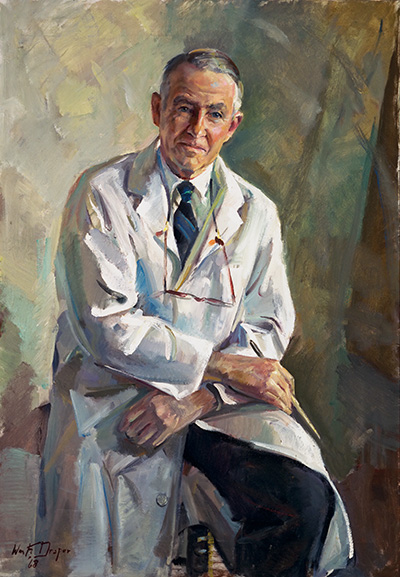John Earle Bordley

John Earle Bordley
- Artist:
- William Franklin Draper
- Date:
- 1968
- Medium:
- Oil on canvas
- Dimensions:
- 47 x 31 in.
John Earle Bordley
1902-1993
Bordley, a director of otolaryngology at Johns Hopkins, was born in Baltimore at The Johns Hopkins Hospital. He earned a Ph.B. from Yale University in 1925 and an M.D. from The Johns Hopkins University in 1929. He completed a surgical internship at Union Memorial Hospital and an internship and residency in otolaryngology at The Johns Hopkins Hospital.
In 1933, Bordley began his academic career in laryngology and otology at The Johns Hopkins Hospital. During World War II he served in the U.S. Army Medical Corps in the 118th General Hospital. He was chief of the ear, nose, and throat division from 1942 to 1944, and chief of the surgical division from 1944 to 1945. During the war, he developed a method of using radium to treat ear maladies among pilots.
Bordley returned to Johns Hopkins after the war. In addition to his position at the medical school, Bordley also held appointments at the School of Hygiene and Public Health starting in 1949. In 1952, he was appointed professor and the first full-time director of the division of otolaryngology. He continued to serve as director of otolaryngology and professor of environmental medicine until his retirement in 1969.
Bordley and colleague William Hardy helped develop a comprehensive approach to the treatment of hearing and speech impairments, and devised a program to match speech pathology and audiology with medical care and screening. Together Bordley and Hardy established the first speech and hearing clinic connected with a medical school. Bordley’s clinical research included long-term studies of hearing loss, and he helped to devise a method using Pavlov’s conditioned reflex and the galvanic skin response to test the hearing of children.
He was a founding member and president of the Society of University Otolaryngologists and president of the American Otological Society. A chair was dedicated in his honor at the Johns Hopkins University School of Medicine in 1990.
Sound Recording. John Bordley / interviewed by Robert Chui and Nancy Quinet. 1975.
"*" indicates required fields
